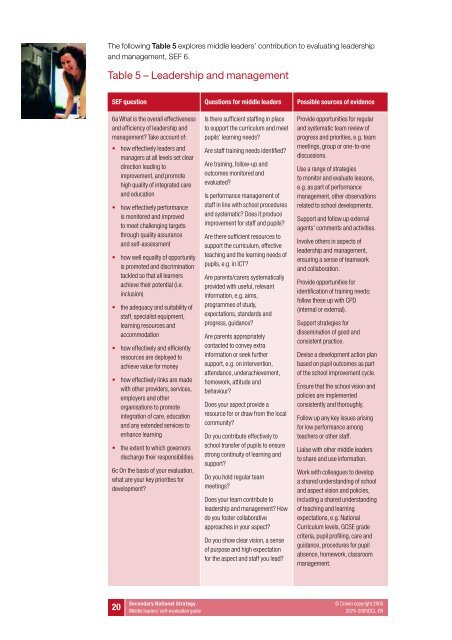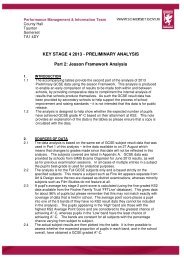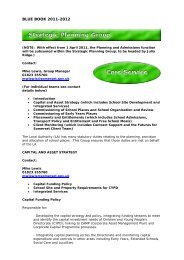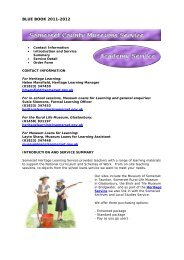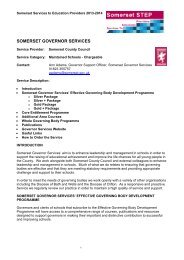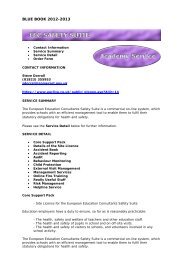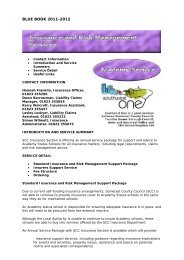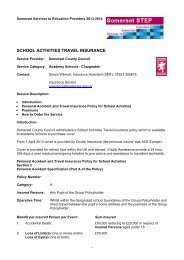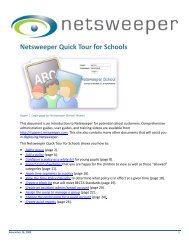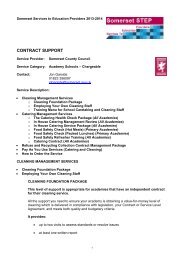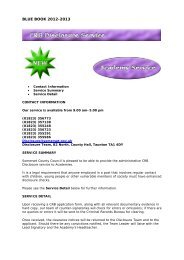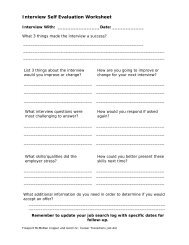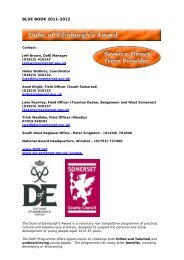Middle leaders' self-evaluation guide
Middle leaders' self-evaluation guide
Middle leaders' self-evaluation guide
You also want an ePaper? Increase the reach of your titles
YUMPU automatically turns print PDFs into web optimized ePapers that Google loves.
The following Table 5 explores middle leaders’ contribution to evaluating leadership<br />
and management, SEF 6.<br />
Table 5 – Leadership and management<br />
SEF question Questions for middle leaders Possible sources of evidence<br />
6a What is the overall effectiveness<br />
and efficiency of leadership and<br />
management? Take account of:<br />
• how effectively leaders and<br />
managers at all levels set clear<br />
direction leading to<br />
improvement, and promote<br />
high quality of integrated care<br />
and education<br />
• how effectively performance<br />
is monitored and improved<br />
to meet challenging targets<br />
through quality assurance<br />
and <strong>self</strong>-assessment<br />
• how well equality of opportunity<br />
is promoted and discrimination<br />
tackled so that all learners<br />
achieve their potential (i.e.<br />
inclusion)<br />
• the adequacy and suitability of<br />
staff, specialist equipment,<br />
learning resources and<br />
accommodation<br />
• how effectively and efficiently<br />
resources are deployed to<br />
achieve value for money<br />
• how effectively links are made<br />
with other providers, services,<br />
employers and other<br />
organisations to promote<br />
integration of care, education<br />
and any extended services to<br />
enhance learning<br />
• the extent to which governors<br />
discharge their responsibilities.<br />
6c On the basis of your <strong>evaluation</strong>,<br />
what are your key priorities for<br />
development?<br />
20<br />
Is there sufficient staffing in place<br />
to support the curriculum and meet<br />
pupils’ learning needs?<br />
Are staff training needs identified?<br />
Are training, follow-up and<br />
outcomes monitored and<br />
evaluated?<br />
Is performance management of<br />
staff in line with school procedures<br />
and systematic? Does it produce<br />
improvement for staff and pupils?<br />
Are there sufficient resources to<br />
support the curriculum, effective<br />
teaching and the learning needs of<br />
pupils, e.g. in ICT?<br />
Are parents/carers systematically<br />
provided with useful, relevant<br />
information, e.g. aims,<br />
programmes of study,<br />
expectations, standards and<br />
progress, guidance?<br />
Are parents appropriately<br />
contacted to convey extra<br />
information or seek further<br />
support, e.g. on intervention,<br />
attendance, underachievement,<br />
homework, attitude and<br />
behaviour?<br />
Does your aspect provide a<br />
resource for or draw from the local<br />
community?<br />
Do you contribute effectively to<br />
school transfer of pupils to ensure<br />
strong continuity of learning and<br />
support?<br />
Do you hold regular team<br />
meetings?<br />
Does your team contribute to<br />
leadership and management? How<br />
do you foster collaborative<br />
approaches in your aspect?<br />
Do you show clear vision, a sense<br />
of purpose and high expectation<br />
for the aspect and staff you lead?<br />
Provide opportunities for regular<br />
and systematic team review of<br />
progress and priorities, e.g. team<br />
meetings, group or one-to-one<br />
discussions.<br />
Use a range of strategies<br />
to monitor and evaluate lessons,<br />
e.g. as part of performance<br />
management, other observations<br />
related to school developments.<br />
Support and follow up external<br />
agents’ comments and activities.<br />
Involve others in aspects of<br />
leadership and management,<br />
ensuring a sense of teamwork<br />
and collaboration.<br />
Provide opportunities for<br />
identification of training needs;<br />
follow these up with CPD<br />
(internal or external).<br />
Support strategies for<br />
dissemination of good and<br />
consistent practice.<br />
Devise a development action plan<br />
based on pupil outcomes as part<br />
of the school improvement cycle.<br />
Ensure that the school vision and<br />
policies are implemented<br />
consistently and thoroughly.<br />
Follow up any key issues arising<br />
for low performance among<br />
teachers or other staff.<br />
Liaise with other middle leaders<br />
to share and use information.<br />
Work with colleagues to develop<br />
a shared understanding of school<br />
and aspect vision and policies,<br />
including a shared understanding<br />
of teaching and learning<br />
expectations, e.g. National<br />
Curriculum levels, GCSE grade<br />
criteria, pupil profiling, care and<br />
guidance, procedures for pupil<br />
absence, homework, classroom<br />
management.<br />
Secondary National Strategy © Crown copyright 2005<br />
<strong>Middle</strong> leaders’ <strong>self</strong>-<strong>evaluation</strong> <strong>guide</strong> 2076-2005DCL-EN


